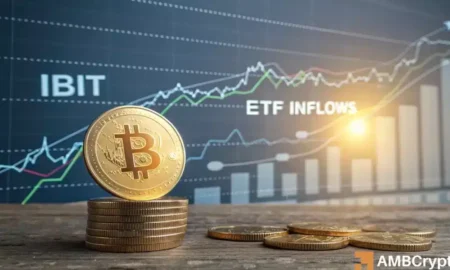Title: Bitcoin as a Hedge Against Economic Instability: Insights from Binance’s Richard Teng
In the constantly fluctuating landscape of global finance, cryptocurrencies, particularly Bitcoin, are gaining traction as potential safeguards against economic turbulence. Binance’s CEO, Richard Teng, recently highlighted Bitcoin’s potential role as a hedge during times of macroeconomic upheaval. Despite the observable short-term volatility exacerbated by renewed trade tensions and policy shifts, long-term perspectives on Bitcoin remain upbeat as investors increasingly recognize the need for resilient assets amidst uncertainty.
As the world grapples with renewed trade conflicts, particularly under former President Donald Trump’s tariff initiatives, the cryptocurrency sector faces significant challenges. The immediate aftermath of these proposals has sparked widespread volatility across various financial markets, with cryptocurrency not being immune. Teng asserts that while initial market reactions often lead to a risk-averse stance—where investors retreat in anticipation of developments—the stark reality is that Bitcoin could ultimately thrive as a resilient investment option in the long run. The growing acknowledgment of digital assets as an effective hedge against macroeconomic problems positions Bitcoin favorably in the eyes of investors seeking non-traditional avenues.
In terms of price movement, Bitcoin has recently endured dramatic fluctuations. Once trading above the $100,000 mark, Bitcoin’s value has dipped below $80,000, with the latest CoinMarketCap update showing a price of approximately $77,879.02—a 1.97% decline in just 24 hours. However, Richard Teng’s optimism shines through despite these setbacks, as he indicates a potential surge in cryptocurrency interest stemming from its perceived status as a non-sovereign store of value. Long-term holders are adjusting their perspectives, recognizing that Bitcoin and similar digital currencies can exhibit resilience during economic downturns and policy shifts, thus enhancing their attractiveness as investment vehicles.
Examining Bitcoin’s market metrics reveals a more nuanced picture amidst the apparent volatility. Current data from AMBCrypto and IntoTheBlock highlight that approximately 73.53% of Bitcoin holders are "in the money," meaning their investments have appreciated since purchase. Contrarily, only around 24.56% of holders are considered "out of the money," which suggests a prevailing optimistic sentiment among investors and points towards the potential for a price rally in the future. This bullish outlook is significant, particularly in light of recent speculative developments surrounding a potential 90-day tariff pause, which briefly stirred market excitement, although subsequently proven false. The market’s immediate and robust positive reaction, exemplified by a 6.5% surge in Bitcoin prices, underscores the king cryptocurrency’s inherent resilience and underlying market strength.
The anticipation of an evolving economic environment continues to impact perceptions of Bitcoin and other cryptocurrencies. As stakeholders increasingly recognize fluctuating economic conditions as catalysts for change, the narrative around Bitcoin’s reliability as a hedge against instability gains traction. Richard Teng’s perspectives suggest that as global economic policies transition and uncertainties increase, more investors might gravitate toward digital assets to secure their investments. This shift not only enhances Bitcoin’s narrative but also solidifies the wider acceptance of decentralized finance as a viable alternative in modern investment portfolios.
In conclusion, the potential for Bitcoin to act as a bulwark against economic instability is becoming increasingly significant in current discussions. Despite experiencing turbulence due to global trade tensions and policy shifts, as noted by Binance’s Richard Teng, the long-term outlook for Bitcoin remains optimistic. The metrics supporting investor confidence, coupled with the growing demand for decentralized financial solutions, indicate a promising future for Bitcoin in the global financial landscape. As more individuals and institutions seek refuge from economic volatility, Bitcoin’s establishment as a credible hedge may pave the way for its broader adoption, ushering in a new era of digital finance.
















